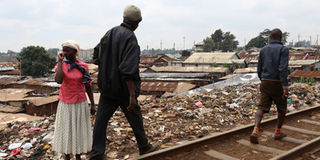Report: World Bank staff biased perception of Nairobi’s poor

Kibera residents walk along the train tracks that pass through the slum. Development professionals may assume that poor individuals may be less knowledgeable than they in fact are. FILE PHOTO | BILLY MUTAI |
What you need to know:
- Development professionals may assume that poor individuals may be less knowledgeable than they in fact are.
- The consequences of bias are profound. The poorest in the world may be doubly burdened.
When a report by the world’s most influential development agency provides evidence that many of its staff are “biased” in their perceptions of the poor and their needs, one might expect eyebrows to be raised.
When the president of that institution — the World Bank, no less — acknowledges the flaw and goes on to call for “measures to mitigate these biases, such as more rigorously diagnosing the mindsets of the people we are trying to help”, jaws should be dropping.
Not since the eminent economist Peter Bauer delivered his critique of foreign aid 50 years ago, famously arguing that the process amounted to a transfer of funds from tax payers in well-off countries to enrich an elite in poor countries, has the concept of foreign aid come under such scrutiny — and from such an authoritative source.
Yet the comments and conclusions not only raise questions about the Bank’s past performance, and the extent to which its projects have been flawed as a result of this bias.
Nor is the 240-page World Development Report; Mind, Society, and Behaviour, a theoretical treatise.
It gives insights into how people make decisions which can have a wide-ranging impact at all levels, whether helping households to save more, or reducing the prevalence of disease.
RANDOM SURVEY
One example of bias is particularly striking. The editorial team responsible for the report conducted a random survey to examine “judgement and decision making” among the Bank’s staff.
Nearly 5,000 were invited to take part in the exercise, and was representative of Washington-based staff, and those who worked for the Bank abroad.
Of the 5,000, 1,850 took part — 900 from headquarters, 950 from country offices — yielding a response rate well above the 1,079 needed to make it representative.
Bank participants were asked to estimate how many of Nairobi’s poorest residents would agree with the statement that vaccinations caused sterilisation.
The same statement was put to the residents themselves. The result was remarkable. Forty-two per cent of the Bank staff estimated that the poor would agree with the statement. But when the statement was put to the residents, only 12 per cent agreed.
A similar gap between the Bank’s assumptions and actual responses were found in Jakarta, Indonesia and Lima, Peru.
In this case, Bank staff predicted that many more poor residents would express feelings of helplessness and lack of control over their future than actually did.
SHAPE POLICY CHOICES
The report notes that development professionals may assume that poor individuals may be less knowledgeable than they in fact are.
Yet beliefs like these shape policy choices. And development professionals, the report makes clear, “are not always good at predicting how poverty shapes mindsets”.
The consequences of bias are profound. The poorest in the world may be doubly burdened.
Not only do they fight a daily battle against poverty. They have to cope with those policies of well-meaning aid donors that owe more to the bias of those who frame them, than to the knowledge of those who are supposed to benefit from them.
The writer is former Africa Editor of the Financial Times




